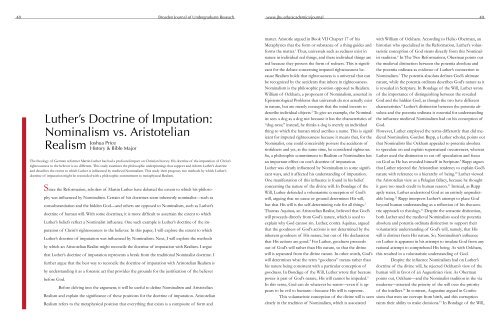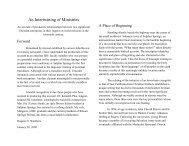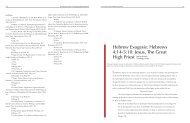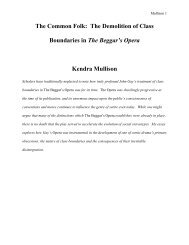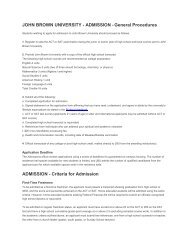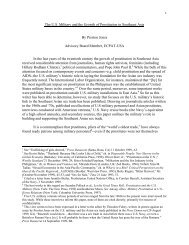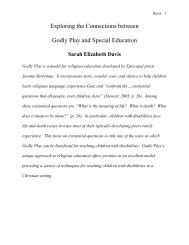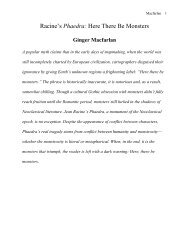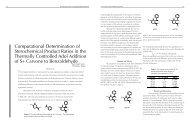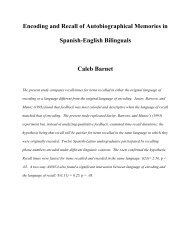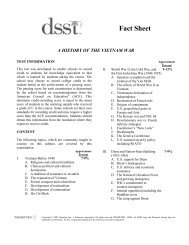Luther's Doctrine of Imputation: Nominalism vs. Aristotelian Realism
Luther's Doctrine of Imputation: Nominalism vs. Aristotelian Realism
Luther's Doctrine of Imputation: Nominalism vs. Aristotelian Realism
You also want an ePaper? Increase the reach of your titles
YUMPU automatically turns print PDFs into web optimized ePapers that Google loves.
48Broaden Journal <strong>of</strong> Undergraduate Reseachwww.jbu.edu/academics/journal49Luther’s <strong>Doctrine</strong> <strong>of</strong> <strong>Imputation</strong>:<strong>Nominalism</strong> <strong>vs</strong>. <strong>Aristotelian</strong>Joshua Price<strong>Realism</strong> History & Bible MajorThe theology <strong>of</strong> German reformer Martin Luther has had a pr<strong>of</strong>ound impact on Christian history. His doctrine <strong>of</strong> the imputation <strong>of</strong> Christ’srighteousness to the believer is no different. This study examines the philosophic underpinnings that support and inform Luther’s doctrineand describes the extent to which Luther is influenced by medieval <strong>Nominalism</strong>. This study then proposes two methods by which Luther’sdoctrine <strong>of</strong> imputation might be reconciled with a philosophic commitment to metaphysical <strong>Realism</strong>.Since the Reformation, scholars <strong>of</strong> Martin Luther have debated the extent to which his philosophywas influenced by <strong>Nominalism</strong>. Certain <strong>of</strong> his doctrines seem inherently nominalist—such asconsubstantiation and the hidden God—and others are opposed to <strong>Nominalism</strong>, such as Luther’sdoctrine <strong>of</strong> human will. With some doctrines, it is more difficult to ascertain the extent to whichLuther’s beliefs reflect a Nominalist influence. One such example is Luther’s doctrine <strong>of</strong> the imputation<strong>of</strong> Christ’s righteousness to the believer. In this paper, I will explore the extent to whichLuther’s doctrine <strong>of</strong> imputation was influenced by <strong>Nominalism</strong>. Next, I will explore the methodsby which an <strong>Aristotelian</strong> Realist might reconcile the doctrine <strong>of</strong> imputation with <strong>Realism</strong>. I arguethat Luther’s doctrine <strong>of</strong> imputation represents a break from the traditional Nominalist doctrine. Ifurther argue that the best way to reconcile the doctrine <strong>of</strong> imputation with <strong>Aristotelian</strong> <strong>Realism</strong> isby understanding it as a forensic act that provides the grounds for the justification <strong>of</strong> the believerbefore God.Before delving into the argument, it will be useful to define <strong>Nominalism</strong> and <strong>Aristotelian</strong><strong>Realism</strong> and explain the significance <strong>of</strong> these positions for the doctrine <strong>of</strong> imputation. <strong>Aristotelian</strong><strong>Realism</strong> refers to the metaphysical position that everything that exists is a composite <strong>of</strong> form andmatter. Aristotle argued in Book VII Chapter 17 <strong>of</strong> hisMetaphysics that the form or substance <strong>of</strong> a thing guides andforms the matter. 1 Thus, universals such as redness exist innature in individual red things, and these individual things arered because they possess the form <strong>of</strong> redness. This is significantfor the debate concerning imputed righteousness because<strong>Realism</strong> holds that righteousness is a universal that canbe recognized by the accidents that inhere in righteousness.<strong>Nominalism</strong> is the philosophic position opposed to <strong>Realism</strong>.William <strong>of</strong> Ockham, a proponent <strong>of</strong> <strong>Nominalism</strong>, asserted inEpistemological Problems that universals do not actually existin nature, but are merely concepts that the mind invents todescribe individual objects. 2 To give an example, the Nominalistsees a dog as a dog not because it has the characteristics <strong>of</strong>“dog-ness;” instead, he thinks a dog is merely an individualthing to which the human mind ascribes a name. This is significantfor imputed righteousness because it means that, for theNominalist, one could conceivably possess the accidents <strong>of</strong>sinfulness and yet, at the same time, be considered righteous.So, a philosophic commitment to <strong>Realism</strong> or <strong>Nominalism</strong> hasan important effect on one’s doctrine <strong>of</strong> imputation.Luther was clearly influenced by <strong>Nominalism</strong> in some significantways, and it affected his understanding <strong>of</strong> imputation.One manifestation <strong>of</strong> this influence is found in his beliefconcerning the nature <strong>of</strong> the divine will. In Bondage <strong>of</strong> theWill, Luther defended a voluntaristic conception <strong>of</strong> God’swill, arguing that no cause or ground determines His will,but that His will is the self-determining rule for all things. 3Thomas Aquinas, an <strong>Aristotelian</strong> Realist, believed that God’swill proceeds directly from God’s nature, which is used toexplain why God cannot sin. Luther, contra Aquinas, arguedthat the goodness <strong>of</strong> God’s actions is not determined by theinherent goodness <strong>of</strong> His nature, but out <strong>of</strong> His declarationthat His actions are good. 4 For Luther, goodness proceedsout <strong>of</strong> God’s will rather than His nature, so that the divinewill is separated from the divine nature. In other words, God’swill determines what the term “goodness” means rather thanhis nature being consistent with a particular conception <strong>of</strong>goodness. In Bondage <strong>of</strong> the Will, Luther wrote that becausepower is part <strong>of</strong> God’s nature, His will cannot be impeded. 5In this sense, God can do whatever he wants—even if it appearsto be evil to humans—because His will is supreme.This voluntaristic conception <strong>of</strong> the divine will is seenclearly in the tradition <strong>of</strong> <strong>Nominalism</strong>, which is associatedwith William <strong>of</strong> Ockham. According to Heiko Oberman, anhistorian who specialized in the Reformation, Luther’s voluntaristicconception <strong>of</strong> God stems directly from this Nominalisttradition. 6 In The Two Reformations, Oberman points outthe medieval distinction between the potentia absoluta andthe potentia ordinata as evidence <strong>of</strong> Luther’s connection to<strong>Nominalism</strong>. 7 The potentia absoluta defines God’s ultimatenature, while the potentia ordinata describes God’s nature as itis revealed in Scripture. In Bondage <strong>of</strong> the Will, Luther wrote<strong>of</strong> the importance <strong>of</strong> distinguishing between the revealedGod and the hidden God, as though the two have differentcharacteristics. 8 Luther’s distinction between the potentia absolutaand the potentia ordinata is essential for understandingthe influence medieval <strong>Nominalism</strong> had on his conception <strong>of</strong>God.However, Luther employed the terms differently than did medievalNominalists. Gordon Rupp, a Luther scholar, points outthat Nominalists like Ockham appealed to potentia absolutato speculate on and explain supernatural occurrences, whereasLuther used the distinction to cut <strong>of</strong>f speculation and focuson God as He has revealed himself in Scripture. 9 Rupp arguesthat Luther rejected the <strong>Aristotelian</strong> tendency to explain God’snature with reference to a hierarchy <strong>of</strong> being. 10 Luther viewedthe <strong>Aristotelian</strong> view as a Pelagian fallacy, because he thoughtit gave too much credit to human reason. 11 Instead, as Ruppaptly states, Luther understood God as an entirely unpredictablebeing. 12 Rupp interprets Luther’s attempt to place Godbeyond human understanding as a reflection <strong>of</strong> his theocentricapproach to theology. 13 Despite the semantic distinction,both Luther and the medieval Nominalists used the potentiaabsoluta and potentia ordinata distinction to support theirvoluntaristic understanding <strong>of</strong> God’s will, namely, that Hiswill is distinct from His nature. So, <strong>Nominalism</strong>’s influenceon Luther is apparent in his attempt to insulate God from anyrational attempt to comprehend His being. As with Ockham,this resulted in a voluntaristic understanding <strong>of</strong> God.Despite the influence <strong>Nominalism</strong> had on Luther’sdoctrine <strong>of</strong> the divine will, he rejected Ockham’s view <strong>of</strong> thehuman will in favor <strong>of</strong> an Augustinian view. As Obermanpoints out, Ockham—and the Nominalist tradition in the viamoderna—asserted the priority <strong>of</strong> the will over the priority<strong>of</strong> the intellect. 14 In contrast, Augustine argued in Confessionsthat men are corrupt from birth, and this corruptiontaints their ability to make decisions. 15 In Bondage <strong>of</strong> the Will,
52Broaden Journal <strong>of</strong> Undergraduate Reseachwww.jbu.edu/academics/journal53<strong>of</strong> transubstantiation. Turretin claimed that accidents cannotbe separated from substance or subsist separately from thesubstance in which they inhere. 32 Oderberg counters this argumentin his book, Real Essentialism, appealing to the fact thatthe metaphysical independence <strong>of</strong> accidents and substance arerequired for essentialism. 33 Oderberg agrees with Turretin thataccidents can never exist without a substance in which to inherein the order <strong>of</strong> nature. Oderberg appeals to the possibility<strong>of</strong> transubstantiation by observing that if God suspendedthe laws <strong>of</strong> nature in a particular location, an accident couldexist while inhering in a substance other than the one in whichit normally inheres. Oderberg defends this suspension <strong>of</strong> thelaws <strong>of</strong> nature by asserting that God can suspend the lawswithout actually breaking them. 34 So, Oderberg would respondto Turretin’s arguments by appealing to a possible circumstancein which God suspends the laws <strong>of</strong> nature to separatethe substance and accidents.Oderberg’s argument seems convincing. However, I think he ismistaken for two reasons. The first reason is that his conclusionseems to destroy the reliability <strong>of</strong> the senses. If Oderbergis correct, then it is impossible to perceive—at least withcertainty—the substance <strong>of</strong> a thing by perceiving its accidents.If Oderberg is correct, there is no certainty in knowledge <strong>of</strong>forms and the very concept <strong>of</strong> substance seems to lose itsmeaning. The senses become unreliable because there is nonecessary connection between accidents and substance. Togive a brief example, if the accidents that I perceive to be abook were under God’s suspension <strong>of</strong> the laws <strong>of</strong> nature, theycould actually inhere to the substance <strong>of</strong> a cow. Oderberg’stheory undermines the possibility <strong>of</strong> certainty with respect toknowing the substance <strong>of</strong> a thing through the perception <strong>of</strong>its accidents.Second, Oderberg’s argument is invalid because it resultsin a contradiction. Oderberg defends transubstantiation byappealing to the possibility <strong>of</strong> God’s miraculous suspension<strong>of</strong> the laws <strong>of</strong> nature. Oderberg asserts that a suspension<strong>of</strong> the laws <strong>of</strong> nature is distinct from breaking those laws. Ithink this assertion is false. Oderberg gives the example <strong>of</strong>a state that has suspended traffic laws for a month (meaningthose who “break” the law are unpunished because thelaw did not apply when the laws were “broken”). However, Ithink this is an inaccurate analogy. There is nothing in humannature that constrains us to obey human decrees. However,the nature <strong>of</strong> substance and accidents do constrain them tobehave in ways consistent with their nature. In other words,an accident can only be an accident ins<strong>of</strong>ar as it behaves as anaccident—inhering in a substance. Thus, a suspension <strong>of</strong> thelaws <strong>of</strong> nature is very different than a suspension <strong>of</strong> humantraffic laws. A suspension <strong>of</strong> the laws that constrain accidentsand substance would necessarily involve a contradiction. Thenature <strong>of</strong> an accident is to inhere in a substance. If, as Oderbergargues, an accident can be present in the order <strong>of</strong> naturewithout a substance in which to inhere, it is no longer an accident,since accidents are defined as such by their inherence ina substance. Due to the law <strong>of</strong> noncontradiction, we see that itis impossible for an accident ever to exist without a substancein which to inhere. Thus, Oderberg’s argument for transubstantiationis invalid.With these arguments in mind, it is apparent that the first optionfor accepting imputed righteousness fails. An <strong>Aristotelian</strong>Realist cannot reconcile imputed righteousness by an appealto the separability <strong>of</strong> a substance and its accidents; the essence<strong>of</strong> righteousness cannot be present in a person along with theaccidents <strong>of</strong> sinfulness. The second option available for an<strong>Aristotelian</strong> Realist is to adopt an understanding <strong>of</strong> imputationas a forensic act that serves as the foundation for justification.In order to explain how imputation might be understoodin this way, it will be necessary to prove two things.First, that justification should be understood in a forensicsense, and secondly, that imputation is the meritorious causefor this justification. Scripture clearly teaches that justificationis a forensic act. In Romans 3:24-26 Paul explained, “they arenow justified by his grace as a gift, through the redemptionthat is in Christ Jesus, whom God put forward as a sacrifice <strong>of</strong>atonement by his blood, effective through faith. He did thisto show his righteousness, because in his divine forbearancehe had passed over the sins previously committed” (NRSV).Here Paul specifically appealed to justification as a forensicact in which God deals with sin as worthy <strong>of</strong> punishment. Perhapseven more persuasive is Paul’s statement to the Romansin 8:3. Paul wrote, “For God has done what the law, weakenedby the flesh, could not do: by sending his own Son in the likeness<strong>of</strong> sinful flesh, and to deal with sin, he condemned sin inthe flesh.” Paul observed that God punished sin in Christ inorder that sinful men might be justified because the law couldnot justify men. Turretin further points out that if justificationis not a forensic act, but rather a moral and substantial act—asthe Roman Catholic Church claimed—it is indistinguishablefrom sanctification. 35 Furthermore, Turretin argued, a personcannot be justified on the basis <strong>of</strong> his inherent righteousnessfor two reasons. First, inherent righteousness is imperfect, andcannot satisfy God’s requirement for perfect obedience to thelaw. 36 Second, justification consists in the remission <strong>of</strong> sinsand the removal <strong>of</strong> guilt. Since inherent righteousness cannotremove guilt or the <strong>of</strong>fense to God, it cannot be the basis <strong>of</strong>the remission <strong>of</strong> sins (and thus, justification). 37 So, justificationcannot be based on inherent righteousness, but must be aforensic act.Given this understanding <strong>of</strong> justification, it is apparentthat sinners are in need <strong>of</strong> a perfect righteousnessby which they can be declared righteous before God. Theimputation <strong>of</strong> Christ’s righteousness serves this very purpose.Luther argued for an understanding <strong>of</strong> imputation that wassubstantive in nature. Turretin modified Luther’s doctrine,asserting that imputation can be understood in two ways. Hestated that Christ’s righteousness serves a tw<strong>of</strong>old purpose,namely, as a forensic imputation that acts as the grounds forjustification and as a moral infusion that forms the basis <strong>of</strong>sanctification. 38 Second Corinthians 5:21 represents the understanding<strong>of</strong> imputation as a forensic act: “For our sake hemade him to be sin who knew no sin, so that in him we mightbecome the righteousness <strong>of</strong> God.” This understanding <strong>of</strong>imputation is actually necessary for an <strong>Aristotelian</strong> Realist. An<strong>Aristotelian</strong> conceives God’s nature as being perfectly unified.This means that every act <strong>of</strong> God must be consistent with allhis attributes. So, in justification, God must be both mercifuland just. Thus, God demands a perfect righteousness thatcan only be fulfilled by Christ’s perfect obedience. Turretinexplained how this obedience is reckoned as the possession<strong>of</strong> the Christian. He argued that no one could stand beforethe rigor <strong>of</strong> God’s court by his/her own works. However,the perfect obedience <strong>of</strong> Christ is reckoned as the believer’s,and it is by his righteousness that believers are forgiven andcounted righteous. 39 Thus, the conception <strong>of</strong> imputation thatis most faithful to <strong>Aristotelian</strong> <strong>Realism</strong> is that <strong>of</strong> imputation asa forensic act that justifies the sinner before God rather thana substantive act that changes a sinner’s essence. A personjustified by Christ’s imputed righteousness remains essentiallya sinful person, but his/her standing before God has changed.To summarize, it is apparent that Martin Luther’s theologywas influenced by <strong>Nominalism</strong>. This influence manifestsitself particularly in his voluntaristic conception <strong>of</strong> the divinewill. However, Luther disagreed with the Nominalist traditionin his doctrine <strong>of</strong> human will and imputation <strong>of</strong> Christ’srighteousness. Luther understood the imputation <strong>of</strong> Christ’srighteousness in the positive sense, rather than in the negativesense described by Nominalists. In this way, his doctrine isrescued from the accusation <strong>of</strong> <strong>Nominalism</strong>. An <strong>Aristotelian</strong>Realist can reconcile Luther’s doctrine <strong>of</strong> imputation in one<strong>of</strong> two ways. The attempt to reconcile it by appealing to aseparation <strong>of</strong> substance and accidents is infeasible because itis contradictory and undermines the testimony <strong>of</strong> the senses.The other option is to adopt a conception <strong>of</strong> imputation andjustification as forensic acts that alter the believer’s standingbefore God rather than his/her essence. This is the view advocatedby Francis Turretin and the Reformed tradition, and itis the best way to reconcile <strong>Aristotelian</strong> <strong>Realism</strong> with Luther’sdoctrine <strong>of</strong> the imputation <strong>of</strong> Christ’s righteousness.
54Broaden Journal <strong>of</strong> Undergraduate Reseachwww.jbu.edu/academics/journal55EndNotes1 Aristotle. “Metaphysics,” in The Basic Works <strong>of</strong> Aristotle,ed. Richard McKeon, (New York: The Modern Library,2001), 810-811.2 William <strong>of</strong> Ockham. “Epistemological Problems,”in Readings in the History <strong>of</strong> Philosophy, ed. Michael Strantzand Maureen Staudt, (Mason, Ohio: Cengage, 2009), 205-207.3 Luther, Martin. “The Bondage <strong>of</strong> the Will,” in MartinLuther: Selections from his Writings, ed. John Dillenberger,(New York: Anchor Books, 1961), 196.4 Ibid.5 Ibid., 181.6 Oberman, Heiko. The Two Reformations: TheJourney from the Last Days to the New World. Ed. DonaldWeinstein. New Haven: Yale University Press, 2003, 24.7 Ibid.8 Bondage <strong>of</strong> the Will, 191.9 Rupp, Gordon. The Righteousness <strong>of</strong> God. Cambridge:Hodder and Stoughton, 1953, 91.10 Ibid., 30.11 Ibid.12 Ibid.13 Rupp, 248-9.14 Oberman, 29.15 St. Augustine, Confessions, trans. Henry Chadwick(Oxford: Oxford University Press, 1991), 197.16 Bondage <strong>of</strong> the Will, 184.17 Bruce, Gustav Marius. Luther as an Educator.Westport, CT: Greenwood Press, 1963, 117.18 Rupp, 152.19 Ibid.20 Luther, Martin. “Disputation Against ScholasticTheology,” in Martin Luther: Selections from his Writings, ed.James Atkinson, (Philadelphia: The Westminster Press, 1962),267.21 Bondage <strong>of</strong> the Will, 187.22 Rupp, 90.23 Luther, Martin. “Commentary on Galatians,” inMartin Luther: Selections from his Writings, ed. John Dillenberger,(New York: Anchor Books, 1961), 111.24 Ibid.25 Disputation Against Scholastic Theology, 270.26 Bruce, 119.27 Luther, Martin. “Two Kinds <strong>of</strong> Righteousness,” inMartin Luther: Selections from his Writings, ed. John Dillenberger,(New York: Anchor Books, 1961), 86-88.28 Ibid.29 Augustine was a proponent <strong>of</strong> Platonic <strong>Realism</strong>rather than <strong>Aristotelian</strong> <strong>Realism</strong>, but the distinction betweenthe two systems <strong>of</strong> thought is not germane to the presentdiscussion.30 Turretin, Francis. Institutes <strong>of</strong> Elenctic Theology.Ed. James T. Dennison, Jr. Vol. 3. Phillipsburg, NJ: P&RPublishing, 1997, 490.31 Ibid., 491.32 Ibid.33 Oderberg, David. Real Essentialism. New York:Routledge, 2007, 155.34 Ibid., 148.35 Turretin, Francis. Institutes <strong>of</strong> Elenctic Theology.Ed. James T. Dennison, Jr. Vol. 2. Phillipsburg, NJ: P&RPublishing, 1997, 635.36 Ibid., 643.37 Ibid.38 Ibid., 647.39 Ibid., 648.Hebrew Exogesis: Hebrews4:14-5:10: Jesus, The GreatPatton ShinallHigh Priest Theology MajorThis paper attempts to answer what the author <strong>of</strong> Hebrews <strong>of</strong>fered to teach in Hebrews 4:14-5:10. Through exegetical hermeneutics thispaper shows what the message <strong>of</strong> this passage is and how Christians are to live in light <strong>of</strong> this Scripture.In Hebrews chapter 4, verse 14 through chapter 5, verse 10, Jesus is exalted as the great high priest<strong>of</strong> the Church. Within this text are some <strong>of</strong> the most important truths regarding Christ’s <strong>of</strong>fice asthe exalted priestly intercessor on behalf <strong>of</strong> Christians as well as his atoning work accomplishedthrough his ministry. As a result, this passage truly is a treasure within the Book <strong>of</strong> Hebrews andthe New Testament as a whole, and because <strong>of</strong> this persistent dedication should be implemented inorder to understand God’s holy and transcendent will and grace spoken within this text.Historical Context.One cannot begin to understand the interpretation <strong>of</strong> any biblical text without first understandingthe historical context <strong>of</strong> the book in question. Donald A. Hagner, author <strong>of</strong> Encounteringthe Book <strong>of</strong> Hebrews writes:Given the central importance <strong>of</strong> grammatico-historical interpretation, the starting pointfor the interpretation <strong>of</strong> any book <strong>of</strong> the Bible is the determination <strong>of</strong> its situation inhistory: its author, approximate date, and place <strong>of</strong> origin, its addressees and their background, its intended purpose, its dependence upon literary and oral sources, and so on(Hauger, 20).


